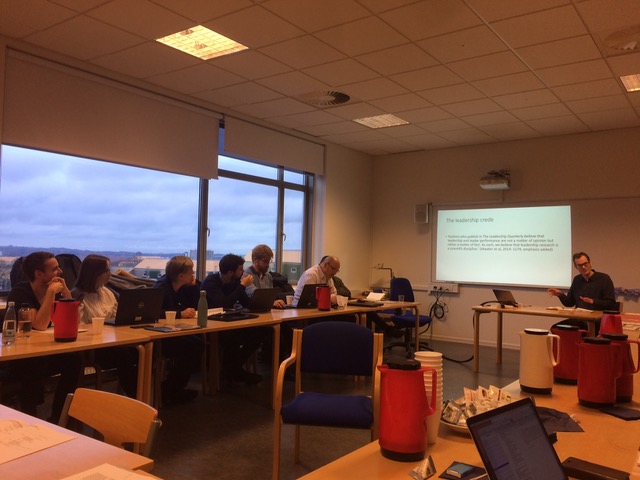A Light in the Bleak Midwinter: Reflections from the Course on Theology, Philosophy and Organization Studies in Aarhus

As one of the last events in the ITN on Human Freedom and Dignity, Jacob Renze Klamer from Aarhus University organized a small course entitled Theology and Philosophy and Organization Studies. This event brought together a motley crew of mixed academic arts, ranging from dusty Old Testament exegetes to clean-shaven management scholars. Some had come with the intention of finding theoretical frameworks to apply in their own work, some had come for the pragmatic end-of-the-year ECTS points, some for mere curiosity. All were pleasantly surprised and united by the engaging dialogue in the interdisciplinary cross field.
Patrick Nullens opened the festivities with a lecture on hope as a core ingredient in both politically and in workplace environments. He confronted the necessity and the difficulties of making relevant the vague and ambiguous term ‘hope’ within a modern context. The necessity, in that hope is an essential and undeniable aspect of life on both an individual and collective level. The difficulties, in the attempt to quantify the term and to establish a scientific foundation for measurement and comparison.
Gerard Hanlon turned out to be a late-born union enthusiast who quickly raised the banners against neoliberal capitalism and the exploitation of workers. This fiery lecture addressed both the violent and oppressive structures of management and the democratic possibilities of keeping the powers of evil at bay.
Guns don’t kill people, but they are often instrumental. Likewise, screens don’t make us unhappy and unfocused, but they are very much involved in the process. With this intro, we were kindly but firmly asked by Bent-Meier Sørensen to remove computers, tablets and phones from our desks and persons in order for us to have a proper discussion. Left with only the archaic tools of pen and paper and a suddenly unencumbered attention, the group could do nothing but listen and respond, as Bent led his technologically impaired disciples through Chaos and Order in the poetics of Genesis towards examples of ritualized dick-swinging in an odd case of management.
At the end of a long day, Uffe Lund from the consultant company Etikos made a valiant attempt at kindling the curiosity of a tired crowd. His lecture was on how to engage workplaces with the ethical concepts and how to establish a shared language to iterate the issues that inevitably challenge personal and professional values. On the last day, Sverre Spoelstra, Skeptic and Pseudo-Science detective, began by undermining his own field of research with the open agenda of exposing the weaknesses and questioning the results and usefulness of leadership studies. Seemingly he was harboring career-wise suicidal ambitions of eradicating his own strand of philosophy altogether but, on the contrary, he insisted that chopping heads off the ugly hydra of leadership studies is a full-scale field of research in itself.
All the various elements of the course combined to form an intriguing reflection of the questions on freedom and dignity in the context of present-day applicability of philosophical and theological terminology and methodology. Invigorated by this notion, people left the course in high spirits and in high hopes of not being completely irrelevant in a post-religious and post-philosophical society.